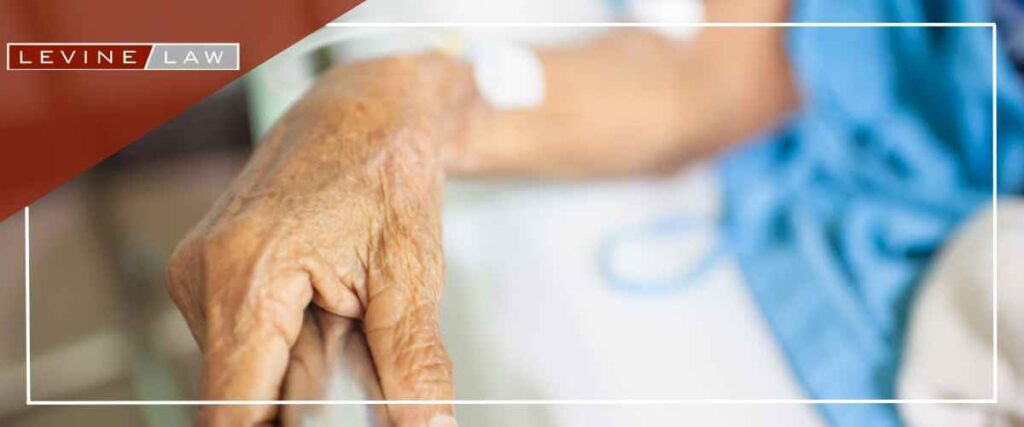There are 97 nursing homes in the Denver metropolitan area and 219 throughout Colorado. While many nursing homes provide the expected quality and standard of care, others fall below this standard.
If you have a loved one in a nursing home, keeping them safe and ensuring they are cared for is likely a priority. Knowing the signs that your loved one is being neglected or abused is important and sometimes confusing.
It is important to realize that some residents suffer health conditions that may make providing care more challenging. Things like dementia, Alzheimer’s, and other mental health issues can result in the resident being non-compliant with nursing home staff. In other situations, these conditions may put the residents at risk to themselves or others in the facility.
Because of these situations, some nursing homes use restraints. However, do you know when restraint use goes from necessary to abuse? Unfortunately, this is a fine line, and it can be hard to tell.
At Levine Law, we understand the impact that nursing home abuse can have on victims and their families. Our Denver injury attorneys can provide advice, guidance, and legal representation if you believe your loved one is a victim of abuse in a nursing home setting.
Restraint Use in Nursing Homes and the Law
Restraints are less common in nursing homes today than a decade ago, but they are still used occasionally.
According to the Code of Colorado Regulations 7.11. 3, physical and chemical restraints are only allowed after a doctor’s order and only when needed to prevent residents from injuring themselves or others. The Nursing Home Reform Act of 1987 further reinforces this, giving nursing home residents the right to be free from chemical or physical restraints.
These laws and acts were created to help prevent abuse and serious injuries to restrained residents.
Unfortunately, some members of nursing home staff still use restraints on residents and misuse them, leaving patients restrained for hours, resulting in injuries, infections, and, in some cases, death.
Recognizing the Warning Signs of Restraint Misuse
If you have a loved one in a nursing home, it is important to recognize the signs of restraint misuse. Some things to look for include:
Visual Clues
It’s important to be vigilant for physical signs on your loved one’s body that may suggest the misuse of restraints. Signs such as bruises or abrasions on the wrists, ankles, or other body parts can indicate that restraints have been applied too tightly or frequently. These marks often signal a deeper problem that needs immediate attention.
Behavioral Changes
Pay close attention to any changes in the behavior of nursing home residents. If a usually active or social individual suddenly becomes withdrawn, refuses to participate in activities, or exhibits fear of being touched or moved, these could be signs of distress related to restraint use.
In addition, changes in sleep patterns, such as excessive sleepiness or insomnia, might also suggest discomfort or anxiety stemming from restraint abuse.
Emotional Signals
Residents who experience inappropriate use of physical restraints might display a range of emotional responses. Look for signs of depression, anxiety, or fear, particularly in situations where they might anticipate being restrained. A sudden reluctance to communicate with family members or caregivers often indicates something is amiss.
Seeking Help
If you observe any of these signs, it’s essential to take action. At Levine Law, we are dedicated to providing legal support and counsel as your nursing home abuse attorney in Denver.
We encourage you to contact us if you suspect your loved one is a victim of restraint misuse. Our team will investigate the situation, address any violations of residents’ rights, and work to ensure their safety and dignity.
Legal Considerations and Potential Cases
Levine Law believes families with loved ones in nursing homes have the right to expect safe, respectful treatment. It’s critical to know that the use of physical restraints should always be a last resort, governed by clear and strict regulations.
Our team at Levine Law is familiar with these legal boundaries and ensures that any infringement on the rights of your loved ones is addressed with the seriousness it deserves.
Navigating Legal Actions
Knowing the proper steps for legal recourse is vital when suspecting misuse of restraints. Initially, this involves gathering evidence and documenting any signs of abuse. This is where we come in.
As experienced Denver injury attorneys, we guide our clients through the process, from the initial consultation to potentially filing a lawsuit. We work tirelessly to secure justice and compensation for the harm caused.
Potential Case Outcomes
Each case presents unique circumstances and challenges, but the goals remain the same: to right the wrongs done to your family members and prevent similar situations. Successful legal actions can lead to compensation for medical expenses, pain and suffering, and sometimes punitive damages to deter future misconduct.
Additionally, these cases often result in changes in nursing home policies or practices, contributing to the safety and well-being of all residents.
Contact Levine Law Today
At Levine Law, we treat every case with the urgency and attention it demands. We stand by your side as your nursing home abuse attorney in Denver, advocating for the rights and dignity of your loved ones. Our commitment is not only to address individual cases of abuse but to drive forward changes that improve the quality of care for all nursing home residents.
If you believe your loved one is the victim of restraint misuse, contact our office to schedule a risk-free consultation.
















